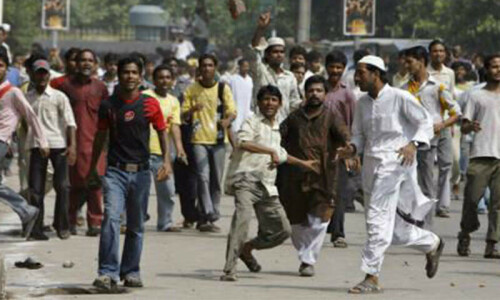KARACHI, Aug 15: “The Taliban’s poetry is not a standalone thing. It contains more than 200 messages.” This was the gist of a talk given by editor of the book ‘Poetry of the Taliban’ Felix Kuehn at an event organised by Oxford University Press Managing Director Ameena Saiyid at her residence on Wednesday evening.
The co-editor of the book, Alex Strick van Linschoten, could not make it to the programme.
Informing the audience of the genesis of the book in a short session, moderated by Asif Farrukhi, Mr Kuehn said he had been a frequent visitor to Afghanistan. The poems translated into English were mostly taken from different websites that governments scrutinised as secret messages.
He said the collection was primarily made in Kandahar from mp3 downloads and audiotapes. He said it was the subject matter of the poems that he found relatable. There were over 200 poems by as many authors. They dated from the 1990s and their topics were universal.
Mr Kuehn said one critic had likened the poems to the poetry of a British soldier who had spent a considerable time in Helmand.
He told the gathering that the Taliban poems had been accused of being used as propaganda material but “a lot of them are personal reflections”. He was aware that the book was an ‘uncomfortable read’ for many; it was always going to be a challenge, he maintained. On the subject of criticism of the book, he said some thought of it as an effort to humanise the Taliban. “They are humans. They have a constituency in Afghanistan,” he argued.
The second part of the programme was moderated by Umair Razi. He discussed the authors’ book ‘An Enemy we Created’.
Mr Kuehn said the book was a detailed study of the Al Qaeda-Taliban relationship and covered the time span between 1970 and 2010 with particular reference to the socioeconomic and education sectors. He talked about the time when the Afghan people thought that the Taliban were gone and real change was coming, but the western powers did not follow up on their promises. In 2003, the local tribesmen asked the Taliban for help, he said.
Contrary to what people think, he added, the Taliban set up schools for girls in the 1990s and more than 20,000 girls were going to school at the time. He said in the ‘90s Al Qaeda was a small group in Afghanistan and many Afghans didn’t like Osama bin Laden; they didn’t believe in Al Qaeda’s programme. However, he added, things changed after 9/11.
With respect to the organisational structure of the Taliban, he asserted that no matter what there would always be splinter groups.
Prior to the author’s talk, Ms Saiyid welcomed the guests after which writer Asif Farrukhi gave an overview of ‘Poetry of the Taliban’.
The discussion was followed by a lively question and answer session.
Replying to a question, Mr Kuehn said we usually held on to stereotypes for often the wrong reasons; even if they were right reasons, we should still discuss them. At that point, poetess Fahmida Riaz commented that we were being killed by the Taliban and their poetry couldn’t change facts. She said it was an attempt to ‘whitewash’ the Taliban. To this Mr Kuehn responded that he was not giving an emotional argument and he had a different understanding of the Afghan Taliban. He said the TTP were different from the Afghan Taliban. The TTP were dangerous because they had greater ambitions, even outside Pakistan.
In response to the question of the ‘form’ of the Taliban’s poetry, he didn’t find it different from the known Pushto or Dari poetry.
Asif Farrukhi told the audience that among other genres, the Taliban had written ghazals in Pushto and Dari as well.












































Dear visitor, the comments section is undergoing an overhaul and will return soon.